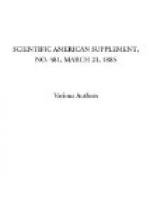For irregular work and comparatively small powers, gas-engines have special and great advantages; and in this respect they may, perhaps, class with gas melting furnaces. If I wanted 1, or 10, or 20 lb. of melted metal, I could melt and make the casting in less time and with less cost than would be required to light a coke fire. There is no possible comparison in the two, as to convenience and economy; but if I wanted to melt 3 or 4 cwt. or 3 or 4 tons every day, I should not dream of using gas for the purpose, as the extra cost of gas in such a case would not be compensated by the saving in time. In commercial matters we must always consider first what is the most profitable way of going about our work; and, so far as I myself am concerned, I have always found it advantageous to expend some money annually on proving this by direct experiment. It is almost always possible to learn something, even from a failure.
I will now, with a blowpipe and small foot blower, heat a short length of locomotive boiler tube to a brazing heat on the table; and, in conclusion, will convert the table into a small foundry. I cannot cast you a flywheel for a factory engine; so will try at something smaller, and will reproduce a medallion portrait of Her Majesty, in cast iron, the original of which is silver, commonly valued at half a crown. From the time I light the furnace until I turn you out the finished casting I shall perhaps keep you eight or nine minutes. I can remember in the good old times 25 years ago, before I used gas furnaces, that it sometimes took about two hours to get a good wind furnace into condition to put the crucible in. My time in those days was not worth much; but if I valued it at 2s. 6d. per week, it would even then have been cheaper to use gas to do the same thing, irrespective of the cost of coke.
The age of gaseous fuel is commencing; and I feel daily, from the correspondence I receive, that there is a growing impression that gas is going to perform miracles. We do not need to go mad about it; and my own precept and practice is to employ gas only where its use shows a profit, either in time or money. Many of those present know that I am as ready to totally condemn gaseous fuel where it does not pay as to advise its use where some advantage is to be gained. You will understand that my remarks apply to coal gas only. As to producer or furnace gases, I know practically nothing, except that sometimes it pays better to burn your candle as a candle than make it into gas, and burn it as a gas afterward. The use of producer gas no doubt pays on a large scale; and things on a large scale, so far as gas is concerned, are not matters with which I have time to concern myself. The commercial use of coal gas has yet to be developed. It is in its infancy; and there are very few, if any, who have any conception of its endless uses, both for domestic and manufacturing purposes. The more general the information which




